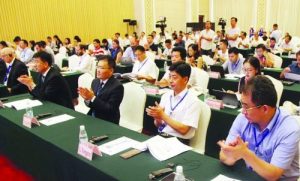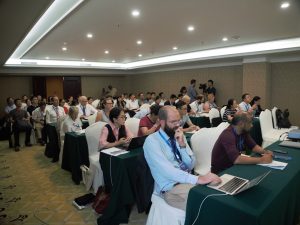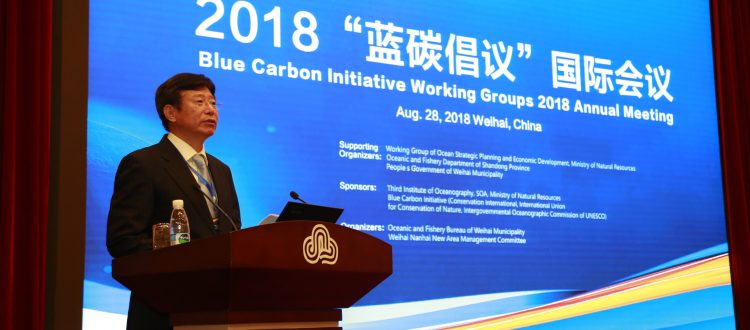How NGOs Can Implement Environmental Policy Change: The Blue Carbon Initiative 2018
Blue carbon refers to the carbon stored by coastal ecosystems, especially in mangroves, salt marshes, and seaweeds, which capture and store most of the carbon buried in marine sediments. Blue carbon plays a crucial role in regulating global climate change. When these carbon-rich coastal ecosystems are degraded and destroyed, they can become carbon dioxide sources due to oxidation of biomass and organic soil. Unfortunately, the rate of loss of mangroves, salt marshes, and seagrasses is estimated to be among the highest of any other ecosystem, prompting international interest in preserving, maintaining, and protecting them for their carbon benefits.
China is one of the few countries in the world that contains the three major blue carbon ecosystems. The coastline of Shandong Peninsula alone is more than 3,000 kilometers long, accounting for 1/6 of the national coastline. The salt marsh is concentrated in the coastal area between the northern and the southern coastline.

More than one hundred experts from around the world attended the conference to preserve and maintain coastal ecosystems.
Weihai, a Chinese coastal city in the Shandong province, hosted the 2018 Blue Carbon Initiative International Agreement from August 28th to September 1st. Nearly twenty international experts and more than forty domestic experts discussed and investigated the effects and application of salt marshes on carbon sequestration. The Blue Carbon Initiative combines the strengths of those in international organizations, governments, and research teams to strengthen an alliance preserving coastal ecosystems, and to better address the changing global climate.
The Blue Carbon Initiative is one of the most internationally influential blue carbon cooperation conferences jointly sponsored by the International Foundation for Conservation, the International Union for Conservation of Nature, and the Intergovernmental Oceanographic Commission of UNESCO.
At the conference, local Weihai officials and multiple organizations partnered together to issue the Weihai Initiative. The initiative states that coastal wetlands are critical in supporting the socio-economic development of the coastal zone as well as mitigating climate change. The initiative also calls for strengthened protection and restoration of coastal ecosystems, and provides further resources for research on carbon cycles, carbon sink functions of healthy aquaculture, and micro-organisms. The conference established a strong alliance for future support on blue carbon ecosystem scientific research, policy development, and international cooperation.

GEI Marine Conservation Program Manager Wang Jing discussing NGO impact on sustainable environmental policy change.
The Contribution of Non-Governmental Organizations in Advancing Climate Change Policies and Its Implications for the Blue Carbon Initiative
Wang Jing, GEI’s Marine Conservation program manager, spoke at the conference to highlight the contribution of NGOs in promoting climate change policies.
Using examples from GEI’s work in climate change policies, Wang illustrated practices GEI has implemented to exemplify methods in which NGOs can contribute to policy change.
In her presentation, Wang Jing shows how GEI has facilitated climate change policies in the following ways:
- Promoted high-level dialogue and cooperation on bilateral and multilateral climate change, including informal dialogue, which promoted the signing of the 2014 Sino-US Joint Statement on Climate Change and the 2015 Paris Climate Change Agreement (COP21).
-
Developed a quantitative analysis tool for low-carbon policies, and trained more than 1,000 officials in more than 15 cities in China, followed by promotion in Sri Lanka.
-
Renewable energy promotion and development, including in Myanmar, Sri Lanka, and in rural areas such as Tibet. In June 2018, GEI also conducted capacity building training for the Ministry of Natural Resources of Myanmar. The project in Myanmar eventually led to the support and cooperation of the former National Development and Reform Commission on Myanmar’s renewable energy projects.

NGOs can play a beneficial role in environmental, sustainable policy change.
In using GEI’s work as a template for NGO work on the policy scale, Wang Jing continued her presentation by taking each example as a method NGOs can implement in contributing to policy work:
- NGOs can provide suggestions and practical case references for governments to develop better blue carbon policies.
- NGOs need to be flexible and resourceful as a bridge between the government and the local community.
- NGOs provide technical support for better policy implementation (including research and development of quantitative tools, blue carbon capacity building training, etc.)
The Blue Carbon Initiative, which took place from August 2018 to September 1, facilitated exchange between Chinese and foreign experts of relevant topics such as blue carbon science and technology, blue carbon policy, blue carbon reserve estimation, marine microbial carbon pumps in marine carbon sinks, and fishery ecosystems. Conferences like these create an intersect for local governments, communities, research groups, and NGOs to converge and, together, take the best path towards the preservation of marine and coastal ecosystems.

